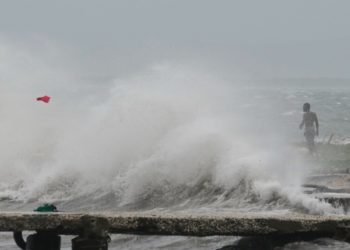Bill Gates issued a lengthy memo Tuesday morning outlining his evolving views on the risks posed by climate change.
In it, he contends that too much effort is focused on reducing near-term planet-warming emissions and argues for keeping human suffering at the center of decision-making when it comes to addressing the risks posed by a warming world.
Gates does say that climate change is a serious problem, but he suggests it should be balanced with concerns about human well-being. “Although climate change will have serious consequences — particularly for people in the poorest countries — it will not lead to humanity’s demise,” he wrote. “People will be able to live and thrive in most places on Earth for the foreseeable future.”
When Gates speaks, people working on climate issues — government officials, corporate executives, nonprofit leaders, activists — tend to listen. He’s one of the world’s richest men and a longtime funder of clean-energy initiatives.
But while his memo is long (more than 5,000 words), it leaves two important questions unanswered.
Is this going to change the way people talk about climate change?
As I reported earlier this year, the billionaire class had already gone quiet on climate issues, not wanting to tangle with the Trump administration.
But with the memo, Gates appears to be trying to reframe the way people talk about climate change, pushing back against what he calls a “doomsday outlook.” Still, he runs the risk of feeding into the narrative that business leaders are walking away from their climate commitments in the face of political pressure.
Michael Oppenheimer, a professor of geosciences and international affairs at Princeton University, said Gates was setting up a false dichotomy “usually propagated by climate skeptics” that pits efforts to tackle climate change against foreign aid for the poor. He warned that “his words are bound to be misused by those who would like nothing more than to destroy efforts to deal with climate change.”
But Ted Nordhaus, executive director of the Breakthrough Institute, an environmental research center, (no relation to Breakthrough Energy, Gates’s own climate group), said the memo represented a sober-minded assessment of the current research.
“While climate change is real and is a problem that we should continue to work to address, it is a chronic problem, not an existential threat,” Nordhaus said, adding that “the solution to it is long-term technological change.”
There’s some truth to this, of course. Even the most dire forecasts don’t predict that rising temperatures will mean the end of civilization anytime soon. And it’s long been understood that a transition away from fossil fuels and toward clean energy will be a central part of the solution.
But what does Gates say to those who feel as if he’s abandoning the fight against climate change with this memo? When my colleague Andrew Ross Sorkin asked Gates that, here’s how he replied:
I’d say, wasn’t the goal here to improve human lives? And shouldn’t we, in our awareness of how little generosity there is to help measure, you know, should we get them a measles vaccine, or should we do some climate-related activity? And if we could take, if we stop funding all vaccines and that, you know, saved you 0.1 degree, would that be a smart trade off? That’s the kind of question we have to ask. So, I’m a climate activist, but I’m also a child survival activist.
Will this change how climate efforts are funded?
It’s important to read the Gates memo in the broader context of his philanthropy.
Gates’s original philanthropic priority was the health and well-being of the poorest people on earth. Over the past nine months, the Trump administration has slashed foreign aid and all but dismantled the U.S. Agency for International Development.
That helps explains Gates’s reorienting of his philanthropic dollars away from climate change and toward global aid.
Oppenheimer said that it was unlikely to change the way governments or businesses view the issue and that “activists will have written him off already.”
How Gates’s memo affects other major funds remains to be seen. But his target audience may be other philanthropies and philanthropists.
“The plea here is to say, OK, let’s take that very limited money and not have some partitioned off for particular causes,” Gates told Sorkin. “Let’s measure it all in terms of the human welfare.”
Climate factors make Jamaica especially vulnerable to Hurricane Melissa
Jamaica, which is being hit by what could be a historic storm in the form of Hurricane Melissa, is particularly vulnerable to the effects of a changing climate.
Much of Jamaica’s population lives in low-lying coastal areas, and since 1993 sea levels have risen about four inches, or 10 centimeters. Research has shown that small increases in sea level can cause outsize damage from storms, in part because hurricanes can push coastal water far inland.
The hurricane made landfall Tuesday, and forecasters are expecting as much as 13 feet of storm surge, a level that “will be devastating” said Jennifer Francis, a senior scientist at the Woodwell Climate Research Center.
In 2012, when Hurricane Sandy slammed the East Coast of the United States, 10 centimeters of sea level rise was found to cause an additional $8 billion in damage, according to a 2021 study. — Sachi Kitajima Mulkey
More Hurricane Melissa news:
It could be even worse in the mountains: The hurricane’s destructive winds could be significantly stronger in Jamaica’s mountains, which cover nearly half the country, than at sea level. Winds could be as much as 30 percent stronger in the hills and mountains, and will most likely destroy structures and fell trees, power poles and most homes. — Francesca Regalado
Melissa had winds stronger than Hurricane Katrina at its peak: The hurricane’s sustained winds of 185 miles per hour are more potent than the winds during Hurricane Katrina’s maximum intensity, which were 175 m.p.h. before weakening slightly.
Melissa’s minimum central pressure has been measured at a staggering 892 millibars. The recording in this key measure of intensity is stronger than Katrina’s peak strength in 2005, and it is the fifth-strongest minimum central pressure ever recorded inside an Atlantic storm. — Judson Jones
For years, islands have warned of climate disaster. They’ve seen little help. It has become a tired adage, but nonetheless true. The world’s poorest countries will suffer the most from climate change despite being least responsible for it.
Leaders in the Caribbean and from vulnerable island states around the world have been repeating this for years. And they have been asking the world’s rich countries, whose greenhouse gas emissions over generations have fueled warmer seas and bigger storms, to help them prepare.
With Hurricane Melissa scouring Jamaica with vicious intensity before setting its sights on Cuba and the Bahamas, it is likely that many of the affected countries will once again be overwhelmed by the expense of recovery. The Caribbean is the world’s most exposed region to climate-fueled disasters, according to the International Monetary Fund, which has said the region requires about $100 billion in economic investment to build resilience. — Max Bearak and Lisa Friedman
Follow our live coverage here.
Quote of the day
“This is something that the vast majority of industry didn’t ask for and doesn’t want.”
That’s from Zach Friedman, the senior director of federal policy at Ceres, a nonprofit group that submitted a letter from 59 companies and investors opposing the Environmental Protection Agency’s plan to erase a scientific finding that underpins climate regulations nationwide.
Karen Zraick and Lisa Friedman report that some big companies — including carmakers, electric utilities and even the oil and gas industry — are pushing back against the agency’s plan to repeal the “endangerment finding,” a scientific conclusion that greenhouse gases endanger public health and therefore must be regulated by the federal government.
More climate news from around the web:
-
António Guterres, the secretary general of the United Nations, tells The Guardian that the world needs to “change course now” and that it is now inevitable that it will blow past the targets in the 2015 Paris Agreement.
-
Reuters reports that the authorities in New Delhi began seeding clouds in an attempt to induce rain and bring down air pollution. “The method seeks to increase precipitation by adding small chemical particles to clouds,” Reuters writes, “around which water droplets form, eventually developing into raindrops.”
David Gelles reports on climate change and leads The Times’s Climate Forward newsletter and events series.
The post The Two Big Questions Surrounding Bill Gates’s Climate Memo appeared first on New York Times.




